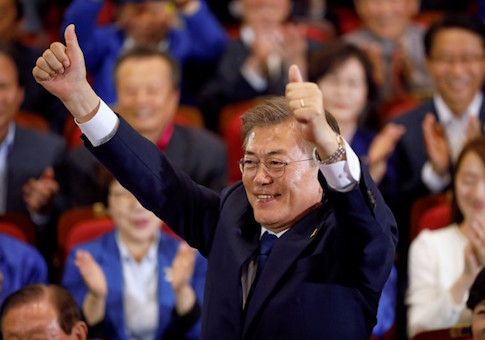Some called it a foregone conclusion; Jae-in Moon, now the 19th President of the Republic of Korea, comfortably celebrated his victory on May 10 after a sweeping 41.1% plurality against 24.0% of Liberty Korea Party candidate Jun-pyo Hong. Though consistently on top during the sixty days of the campaign period, the Democratic Party candidate fought an intense battle in the election, unparalleled in its brevity, timing, and the number of candidates.
While his political career leading to his inauguration may be short, Jae-in Moon’s political participation is long- lived. Moon, like many of his generation, had been a student activist in the protests against the dictatorship under the Yushin Constitution during his university days. After passing the bar exam, he graduated as salutatorian but was denied the title of a judge due to his protests against father of Geun-hye Park and former President Chung-hee Park. Instead, Moon became a human rights lawyer, which led to a fateful partnership between President Moon and former President Moo-hyun Roh. The two formed a joint law office, and their close friendship persisted, resulting in Roh appointing him Senior Secretary to the President for Civil Affairs in 2003.
After serving various positions in Roh’s administration, Moon’s debut in the political scene came in the wake of Roh’s passing. Moon attracted the attention of the Democratic Party when he garnered public recognition in his heading of the Roh Moo-hyun Foundation. He was elected in the 19th general election as a National Assembly member representing Busan and quickly surged in popularity. Instituted as the leader of the current Democratic Party and its two previous iterations, Jae-in Moon rivaled Saenuri Party leader Geun-hye Park as a liberal opposition to her conservatism. During the 18th presidential election, Moon faced a narrow defeat even after renowned entrepreneur Cheol-soo Ahn resigned from his candidacy after realizing a split vote would ensure Park’s certain victory.

Learning from his mistakes and boosted by the decline of conservative influence, Moon formulated a strategy to maintain his dominant popularity. Over the month of April, Moon remained above a solid 40% approval rating, with the smallest gap being 1% between Moon and People’s Party candidate Ahn, which only lasted briefly.
Nonetheless, the campaign trail had been tumultuous; unlike the previous presidential election, centrist Ahn and Justice Party’s Sang-jung Sim threatened Moon’s popularity while Jun-pyo Hong creeped up as the strongest conservative contender among the five major presidential nominees. Ahn especially lingered right below Moon during the second week, but saw a sharp drop afterwards. Instead, Hong continually rocketed upwards near the end of the race despite his controversial remarks regarding his involvement in lacing a woman’s drink with pig hormones and mistreatment of his father-in-law.
Sim conquered most televised debates, an aspect in which Moon has been criticized for being too soft in expressing his arguments. A blow came when Moon stated in the fourth television debate on April 25 that he “opposed and disliked homosexuality”, which ignited an outrage from LGBTQ activists and supporters. His proclamation addressed the contentious topic of criminalization of homosexuality in Korean military that some claimed violated human rights.
However, the issue ultimately left little impact on the results of the election. When nearing election day, Moon focused on enlarging the approval gap in order to guarantee a strong influence in the parliament. He continued campaigning in the northern regions, and on the final campaigning day, Moon returned to Gwanghwamun Gate; the last destination reminded the public of his participation in the candlelight vigils among the citizens and his commitment to eradicating the government of corruption caused by former President Park and her associates.
The next day, he stood in front of 500 officials at the National Assembly Building as the new president in charge of a nation shaken by scandals of corruption within the government he must now lead. During his inauguration speech, Moon announced the start of “the era of a Gwanghwamun Gate president”, emphasizing his resolve to creating a new, open administration that will uphold communication between the presidency and the citizens above all else. President Moon has opened democracy’s doors; analyzing the policies that will cross the threshold is a task for the next five years to come.

